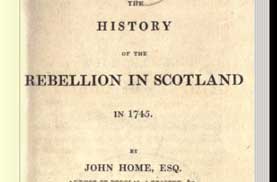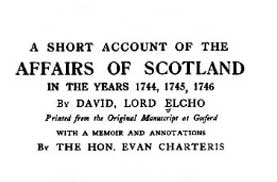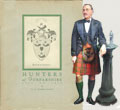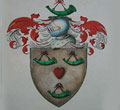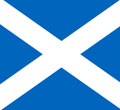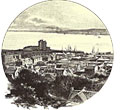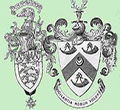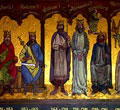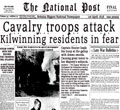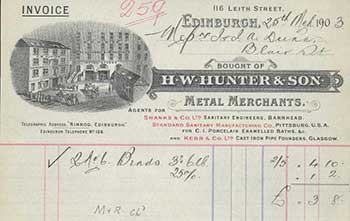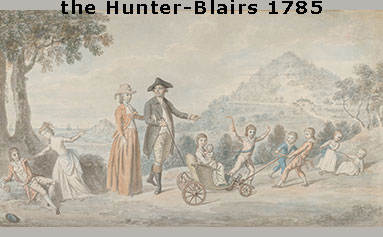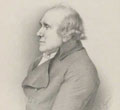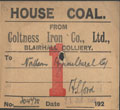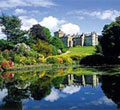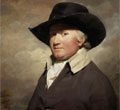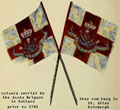David was a young and wealthy land owner in Angus he had powerful and influential friends not only in his own right but through his young wife, Barbara, daughter of Peter Gordon of Abergeldie.
He was a year younger than Prince Charles and the same age as Lord Elcho, who he was to share many of his later misfortunes and adventures with.Jacobite Uprising
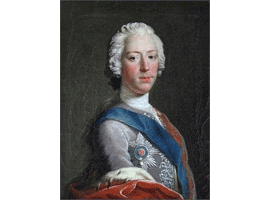
On Jan 30, 2016
Probably the most noteworthy Hunter Jacobite was Captain David Hunter 7th Laird of Burnside. Born September 27, 1721 he succeeded to the Lairdship at the age of six on the death of his father. When the call came he rallied to Charles Edward Stuart's side.The first published mentions were, " The Prince Created a Committee for providing the army with forage. It was Composed of Lord Elcho President, Lord Dundee, Sir William Gordon of Park, Hunter of Burnside...... They issued out orders in the Princes name to all the Gentlemens houses who had employments under the Government to send in certain quanties of hay, straw, and corn upon, such a day, under the penalty of military execution if not complied with, but their orders were very punctually obeyed."
Lord Elcho had first met with the Prince, as youths, in Rome and they enjoyed each other's company.
Elcho joined the '45 in Edinburgh and was made aide de camp. He appointed David Hunter of Burnside, Captain in the Prince‘s Life Guards. A position he held until Culloden.Whether due to a sense of forboding or merely affection, twelve days before the battle, David managed to stop of at Forfar on the route north and signed over the estate of Burnside to his wife Barbara. Without which the Hunter lands in Forfar would have been seized by the crown.
The next we hear of David was about the advance of the Government Forces, four days before Culloden, "The 12th, by Six o clock in the morning their advanced Guard appeared at Gordon Castle, and in half an hour after the whole army and a fleet of eight and twenty sail cast anchor at the mouth of the river. This fleet which carried their baggage and provisions and always sailed when the army marched, and cast anchor at night opposite to where the army encamped. Upon The Dukes armys appearing, the Duke of Perth and Lord John Drummond assembled all the troops they had with them upon the side of the Spey, and as it was not possible to prevent the passage of the river, as it was fordable every where, they retreated to Elgin in good order, where they arrived about twelve o clock. Lord John Drummond sent out Mr Hunter of Burnside with a party of Lord Elcho‘s troop to get intelligence. Mr Hunter went so near their advanced guards, as to get his horse shot under him, and if Mr Vaughan to the great risk of his life had not taken him on behind him, Mr Hunter would have been taken prisoner. Mr Hunter informed Lord John that the Dukes army had pitched their Camp on the north side of the Spey; at ten o'clock that night the Duke of Perth marched all the troops out of Elgin to Forress, and then to Nairn.
Then Culloden happened.
The manhunt and the genocide followed.
In May 1746 some of the rebels with a design to make their escape got on board James Wemyss's sloop at Broughty Ferry and having put to tea landed at Bergen in Norway but an order having been given by the King of Denmark to inspect all British vessels that should come into his ports and to confine all that had no proper certificates or passports meant the rebels were on 13th May committed as prisoners to the Castle of Bergen among whom were David Graham of Duntrune called Lord Dundee, Lord Ogilvie, Fletcher of Balinahoe and Hunter of Burnside
He escaped and fled to Denmark then walked to Paris. Arriving in a sorry state he met up again with his friend Lord Elcho.
Lord Elcho and David moved around seeing and meeting. There were Jacobite friends and communities in Paris, Bologne, Cleves, Padau and Venice. David lived in Venice for some time, and was killed fighting a duel over a lady in 1758.
other Hunter Jacobites from Angus
- Adam Hunter, excise officer Montrose, prisoner there
- Henry Hunter, Newton of Arbirlot, soldier of Ogilvy's Regiment
- James Hunter, in Cotton of Letham, St Vigeans, soldier of Ogilvy's Regiment
- John Hunter, in Newton of Arbirlot, soldier of Ogilvy's Regiment
- James Hunter, son of John Hunter in Newbigging, St Vigeans, soldier of Ogilvy's Regiment
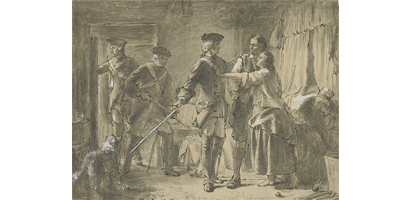
Murray of Broughton was a lifelong Jacobite and ended up as secretary to Prince Charles. He was "sick" and missed Culloden. Afterwards fleeing south he sought for safety in the house of his brother in law Mr Hunter of Polmood in Peeblesshire but information having been given of his retreat he was apprehended on the morning of Saturday the twenty eighth of June by a party of St George's dragoons. He was carried to Edinburgh and committed the same evening a close prisoner to the castle.

Glasgow was hostile to the Jacobite cause:
the town was controlled by the head of Clan Campbell, Archibald 3rd Duke of Argyll, a loyal Hanoverian and bitter opponent of the Stuarts. The militia in Glasgow were sorely depleted having to supply extra men to Stirling Castle and man the bridges over the Forth. The Jacobites, on their return from Derby, had already sent their demands for sustenance and were due soon to collect. Letters were sent to get more men.Letter from Lord Glencairn to Robert Hunter the 23rd. Laird of Hunterston.
Stirling 17th. December 1745Sir,
As we have reason to believe that, the rebels are approaching towards Scotland, In my Lords absence, I am ordered by General Blakeney to desire you without loss of time to send what men you can raise to Glasgow. Be sure they bring such arms they have along with them, and the General will have Arms and Ammunition to supply what is wanting.
Sir,
Your most humble servant
Glencairn
Hunter of Hunterstoun Esq.

